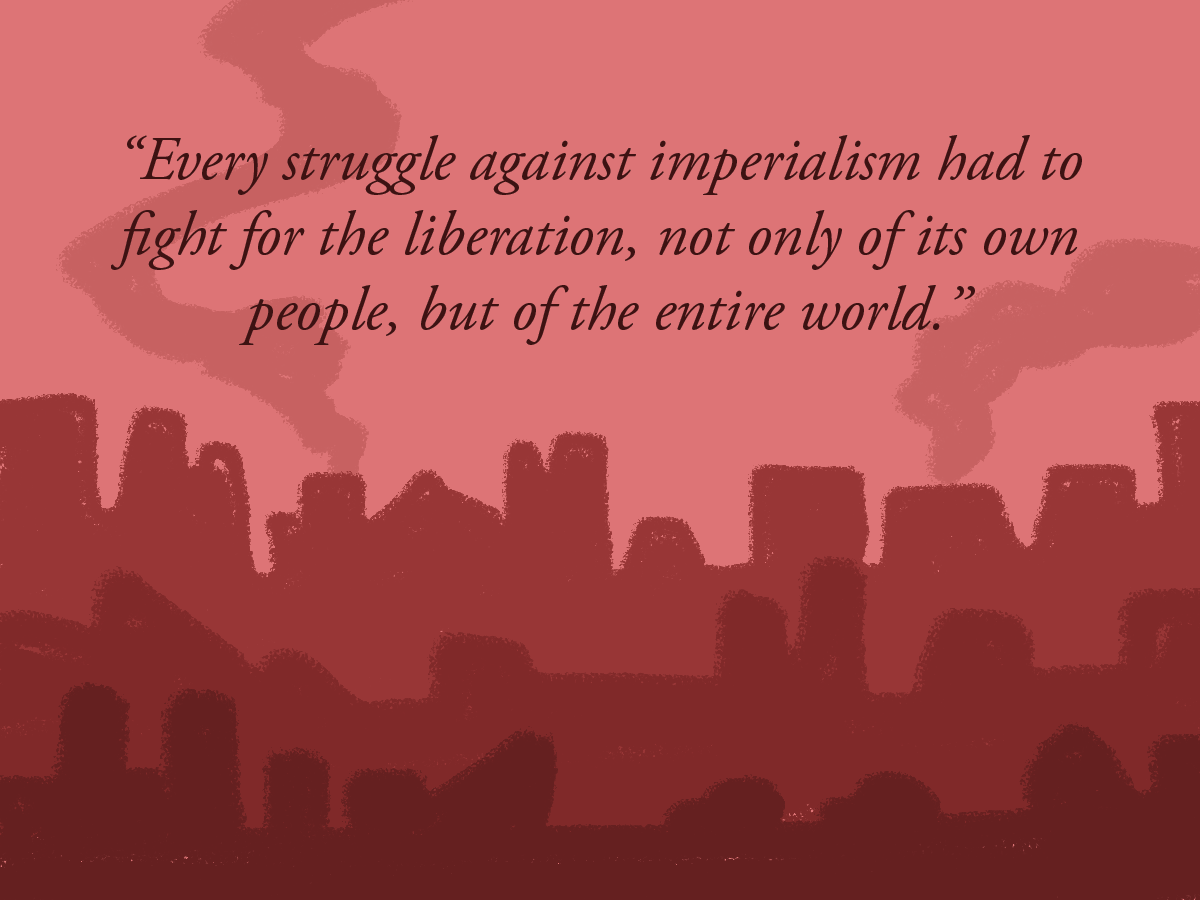On Thursday, Feb. 13, members of the Macalester community gathered at the John B. Davis Lecture Hall for the 44th annual G. Theodore Mitau Endowed Lecture presented by scholar and activist Charmaine Chua. In her talk titled “What does anti-imperial working class internationalism mean today?,” Chua, an assistant professor of global studies at the University of California Santa Barbara, read out the final chapter of her upcoming book. She explored the themes of internationalism and class composition and how they should be re-evaluated in the context of supply chains.
Chua began the talk by recounting a story of how she and other organizers in 2014 tried to convince dock workers on America’s West Coast to participate in the launch of blockades at ports on the West Coast in response to Israel’s Operation Protective Edge, which resulted in the killing of more than 2,000 Palestinians. While the workers were sympathetic to their cause, most were unwilling to walk from their jobs and sacrifice the wage they would have earned from that shift.
“Although longshore workers are critically aware of their centrality to the global economy and the structural power that they hold at a major choke point in global supply chains, this did not necessarily translate into a willingness to wield that power,” Chua said.
They then went on to explain that this situation encapsulates the issues of contemporary internationalism — the difficulty of “linking interest between approximate here and a distant there.” While the workers did sympathize with the Palestinian suffering, they were unwilling to commit to a material sacrifice that went against their immediate needs.
According to Chua, this is an example of the “ongoing features of three organizing dilemmas common to social movements:” the first being what internationalism is, second who its actors are and finally, how it should be built in the long term. To address these dilemmas respectively, she proposed three orientations: concretization, composition (or recomposition) and codification.
They first acknowledged that when speaking about internationalism, scholars often depict it as an abstract concept, rather than a worldwide consciousness opposing global capitalism “beyond the rhetorical and symbolic.”
In order to survive, many trade unions must ally with national capitalist classes and states. Nationalism and the involvement of states, is an essential part of internationalism. To explain how nationalism ties into the international anti-imperial struggle, Chua suggested a Leninist lens.
“[Vladimir] Lenin’s position on internationalism was that it was a political project that grappled with the role of the nation state in the struggle for international socialist revolution, witnessing how colonial powers had doubled their territory in the last half of the 19th century,” Chua said. “Every struggle against imperialism had to fight for the liberation, not only of its own people, but of the entire world.”
The task of communist parties was thus to gain national independence, construct socialism and then unite these newly socialist states under unified federations. Lenin did so with the help of Vietnam and other nations that, at the time, fought for their independence. This made Lenin, according to Chua, “an eminently practical thinker,” as he was able to apply his theory to his immediate real life context.
Connecting this back to the present day, Chua recounted the 2022 story of Amazon workers in San Diego who united in support of their Mexican coworkers having to commute over the US-Mexico border every day. By employing Mexican workers, Amazon was able to decrease wages, capitalizing on Mexico’s underdeveloped economy, and mobilize “border imperialism to squeeze and cut the cost of labor.” Standing in solidarity with their less privileged coworkers, Amazon workers brought to their leadership a petition with more than 600 worker signatures, eventually winning “free shuttles from the border by attending to the urgent social needs of fellow workers in Mexico.”
Through this example, Chua showed that international solidarity came not from a philosophical higher ground but rather from the realization that the immediate needs of workers across borders were connected, encouraging them to fight together, for each other.
Moving to discuss internationalism’s current actors, Chua acknowledged that today, most expressions of internationalist struggles are taking place in the streets through blockades, occupations and sit-ins organized by community activists. It seems that workers’ strikes at points of production are no longer the core tactics of internationalist expression. In fact, it is often assumed that workers along the supply chain are, for their lack of resistance to the capitalist system, enemies of community organizers and activists, rather than comrades.
“In reality, we are all workers, whether acting at our place of work or outside of the workplace and industry,” Chua said. “It is not as if our class identity disappears depending on where we exercise our power.”
Chua then gave another example of organizing — the blockade of BAE Systems factory in Glasgow. During this blockade, protestors and workers successfully shut down the factory that makes 15 percent of the parts for F-35 stealth bombers, which have been used in Israel’s attacks on Gaza. It was through the joining of forces of the working class that the organizers successfully carried out meaningful change, Chua asserted.
Chua concluded her talk by addressing the Macalester students sitting in the audience.
“A generation of young socialists, some of whom I know are in the room, are beginning to understand that the change in composition of the working class in the imperial core requires not relinquishing spaces of class struggle, but working within them alongside other workers,” Chua said.
“If we believe in a world in which every human has the right to a dignified life, and if we believe in our power to stop the forces that prevent that flourishing, is to build collectivities that can engage in concrete analyzes of where the class struggle is in all its shapes, forms and complexities, can build durable institutional power ground ourselves in accountability to each other.”





